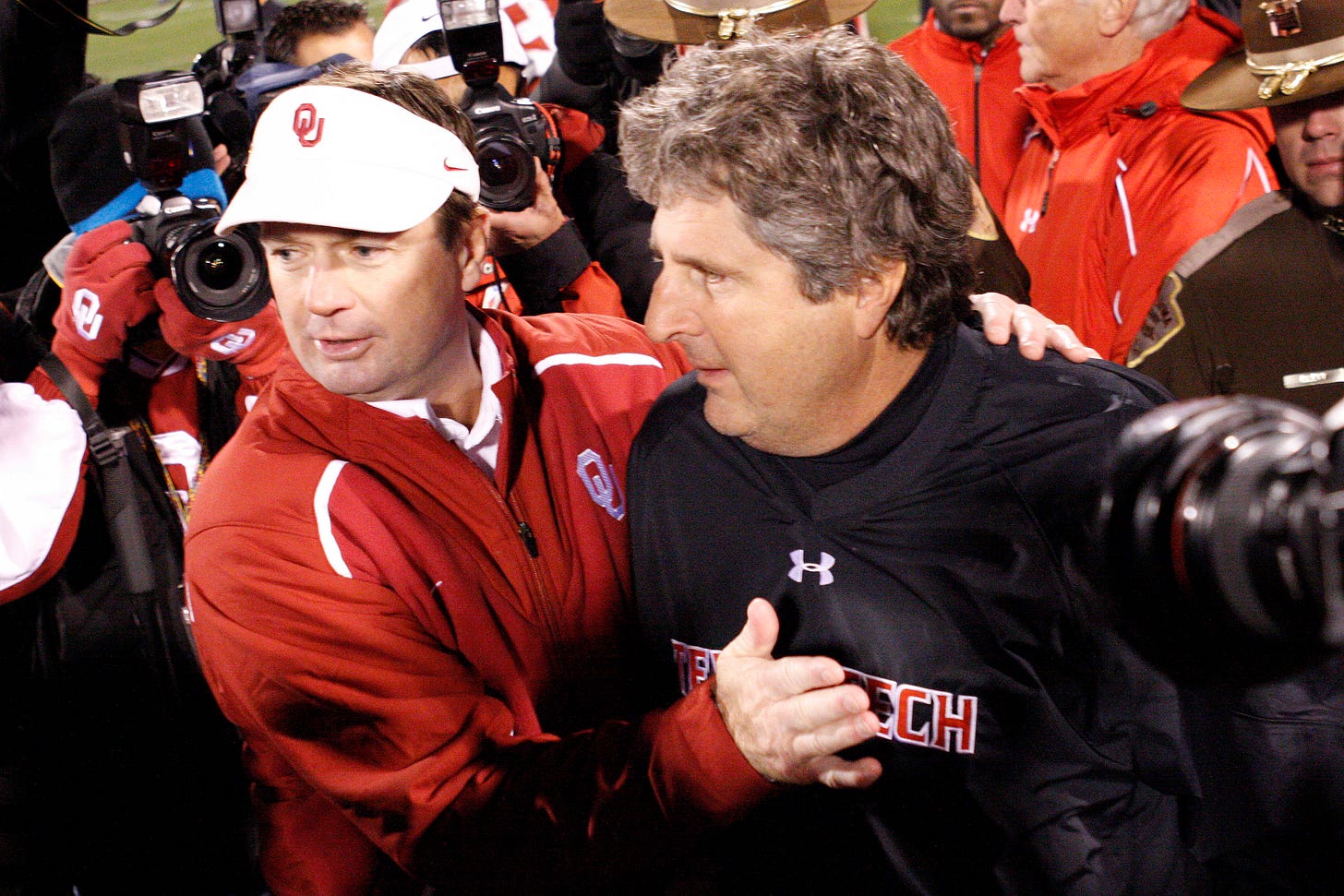The one and only Mike Leach

I didn’t think I had a Mike Leach column.
I had the Sooner football beat his one Sooner season, had a front row seat to his mad genius, but what I lack are stories.
The only one I really have is him being the first and maybe the last college football coach to call me at the office.
He was definitely the first.
I can’t recall if I had the same experience with Mark Mangino or Brent Venables but I might have. I know I interviewed them in their offices … the whole lot of it being very unusual today, access now as regimented as the program can possibly make it.
So yeah, it was cool he called me, stayed with me in his driveway for 15-20 minutes of questions and conversation, but that’s about it.
Oklahoma had yet to play a game.
Who knew then Mike Leach would become MIKE LEACH.
So not really a story.
Then I thought of other things.
Like how every single person who’s said something like, “Well, Bob Stoops lost five games his first season,” as though Stoops, like Venables, also struggled out of the chute, had no idea what they were talking about and the reason they didn’t was Mike Leach.
Like, if I stop and think about how Oklahoma high school football games all once began at 7:30 p.m. but the vast majority now and for a very long time begin at 7, that was all about Mike Leach, too.
Of course, if you’re not grasping how the games moved back half an hour, even after Leach left for Texas Tech and later Washington State, what you’re missing is his impact. At the collegiate level, he changed how football was played nationwide and in Oklahoma at least, it filtered down to the high schools and, if you’ve forgotten, the clock stops for incomplete passes.
Begin at the top.
• The ’99 Sooner season was not a trying season. Stoops might have thought so, giving up a 23-14 halftime edge at Notre Dame and a 17-0 lead against Texas, but fans were dancing in the streets.
Third game, Oklahoma topped Louisville, which nobody saw coming. Nobody thought the Sooners would be in the game against the Irish and Longhorns either, yet they led big.
By halftime of the fourth game, in South Bend, Josh Heupel had already thrown his 15th touchdown pass of the season, breaking in less than four games Cale Gundy’s previous program mark of 14, even throwing many of them to guys who’d been recruited to play defensive back by the previous regime, like Curtis Fagan, Damian Mackey and Andre Woolfolk.
That was all Leach.
Heupel completed 310 passes in 12 games, almost 26 per outing. No Sooner fan had ever, ever, seen anything like it. And coming out of the John Blake era, it was more than any Sooner Nation citizen dared dream.
Finishing 7-5 wasn’t a disappointment but, given recent history, a miracle.
A circus, too.
Leach the ringleader.
• When I started covering high school football in Oklahoma in 1993, any game going past 10 p.m. was a slog. The kick came at 7:30 and everybody expected it done in 2 1/2 hours.
But within two, three, four, five years of his single Norman season, that was over.
Leach termed his offense the “Air Raid” upon conceiving it with Hal Mumme at Iowa Wesleyan around 1990 and eventually, the majority of high schools in our state, the bigger ones at least, ran some version of “the spread.”
Around here, Westmoore, under Mike Whaley, was an early holdout. So was Norman High, under both Butch Peters and Greg Nation. Still, a few bucking the trend aside, even those maintaining strong run games were doing it out of formations popularized by Leach.
Spreading the field created more space, more points, more drives, more snaps and more clock stoppages.
When Brent Barnes had Norman North rolling, scoring about every drive and kicking onside, the T-Wolves could kick at 7 and finish past 10:30. Pretty much the only people who resented Leach were sportswriters upset about the deadline pressure his influence created.
• One the one hand, the whole idea behind the Air Raid is pretty simple. And the offense itself is pretty simple, too: not too many plays, but each able to be run from myriad formations.
The basic idea couldn’t be more simple.
Quarterback aside, as many as six players, even in the 3-yards-and-a-cloud-of-dust days, are eligible to catch the ball and if all six are put in position to catch a ball, all kinds of stress is placed upon the defense, suddenly having to cover so many would-be receivers in so much more space than previously imagined.
Yet, somehow, for about a century, offensive football coaches ignored those facts entirely. It was group think run amok, a brand of homogenous toughness coaches would rather adhere to than be creative trying to win.
Malpractice.
Offenses huddled for about a century, too.
Mumme and Leach put an end to all that and Leach, more than Mumme it turned out, was constitutionally equipped to run big college football programs in three of the biggest conferences, the last of them Mississippi State, where only three weeks ago the Bulldogs closed out the regular season with a 24-22 victory at 20th ranked Ole Miss, pushing them to 8-4 and into the top 25.
All that and it always seemed like Leach lived 36-hour days while the rest of us settled for 24.
How else did he spend so much time on the phone, become so well read and become expert on so many things, from Geronimo to piracy, to wedding and marriage advice.
We revere winners.
But we’re moved by pioneers.
Gobsmacked by trailblazers.
And love a great quote.
Mike leach filled every box.


Great column.